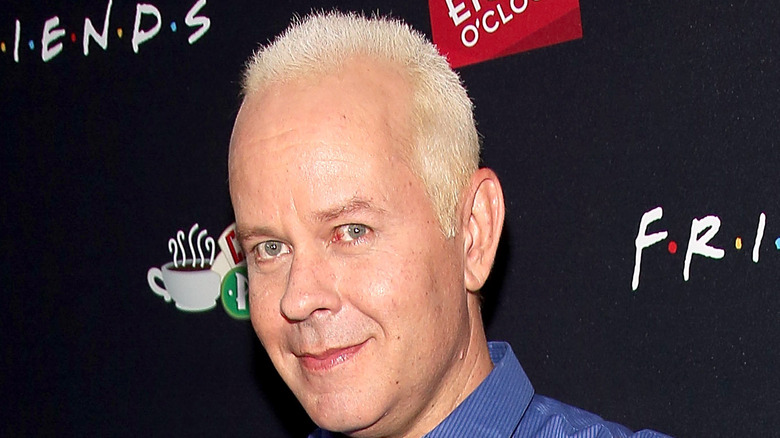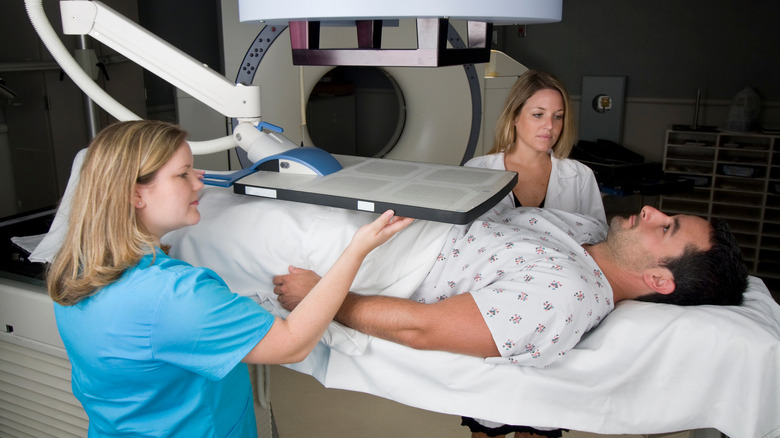Friends Star James Michael Tyler's Cancer Diagnosis Explained
James Michael Tyler, the actor who played Gunther on the hit show "Friends," revealed that he has stage 4 prostate cancer. Appearing on the "Today" show on Monday, Tyler publicly opened up about his diagnosis for the first time, revealing that he has been living with advanced prostate cancer for almost three years (via Today). According to the "Friends" star, he was first diagnosed during an annual checkup in September 2018.
Although Tyler's cancer was initially treated with hormone therapy, it has since spread to his bones and spine, rendering him unable to walk. Tyler attributes this progression to missing a doctor's appointment during the pandemic. "I missed going in for a test, which was not a good thing," he said on the "Today" show. "So the cancer decided to mutate at the time of the pandemic and so it's progressed." As a result, Tyler is now undergoing chemotherapy, which he claims is more aggressively fighting his cancer. Due to the severity of his illness, Tyler was unable to physically attend the "Friends" reunion that aired on HBO Max in May. However, he was able to make a virtual appearance.
What is prostate cancer?
Prostate cancer is a common type of cancer that occurs in the prostate gland. Part of the male reprodcuctive system, the prostate is a small gland located under the bladder and in front of the rectum (via Healthline). The prostate produces seminal fluid, which helps transport sperm through the urethra. It can also help control the passage of urine.
One of the most common cancers in the United States, prostate cancer occurs when a malignant tumor forms in the prostate gland. According to the American Cancer Society, 1 in 8 men will be diagnosed with prostate cancer at some point in their lives and 1 in 41 men will die from it. This is because prostate cancer can be treated and eradicated if it's detected early. That's why it is important to receive yearly prostate cancer screenings.
While it is possible to get prostate cancer at any age, it's more common among people over the age of 65. Other risk factors include obesity, genetic changes, family history, and race. For reasons unknown, Black men are more likely to develop prostate cancer than their white, Hispanic, and Asian counterparts.
What are the symptoms of prostate cancer?
Unfortunately, there are no early warning signs of prostate cancer. That's because early-stage prostate cancer doesn't usually cause any symptoms. It is only until after the disease has progressed that the classic signs and symptoms of prostate cancer begin to occur (via Best Life). Advanced prostate cancer, however, can cause a whole host of painful and uncomfortable symptoms. For example, prostate cancer can cause erectile dysfunction, pain or discomfort when sitting, pain in the hips, pelvis, or thighs, pain or stiffness in the lower back, and bone pain.
"In adults, the most common form of bone cancer is when cancer from another organ has traveled to the bone. It has metastasized to the bone. In men, it's commonly prostate cancer," Dr. Gregory Domson, an orthopedic surgeon in Richmond, Virginia, told UVA Health. "So, if you have bone pain, that's going to be a clear indicator that something is going on."
People with prostate cancer can also experience a variety of bladder-related issues, including difficulty urinating, urinating too frequently, having a weak flow during urination, and being unable to control urination.
The importance of early detection
Since there are no early warning signs of prostate cancer, the best way to catch and detect it early is through regular prostate cancer screening tests (via Mayo Clinic). Screening tests measure prostate-specific antigen (PSA) levels in the blood. High levels of PSA in the blood indicate that cancer may be present.
Although most medical organizations typically don't recommend PSA screenings until the age of 50, people who belong to a high-risk category should start talking to their doctors about getting tested at age 40. "PSA screening can be done on men of any age," Dr. Matthew Rettig, Tyler's oncologist, told Today. "The idea of PSA screening is to identify the cancer and diagnose the prostate cancer at a much earlier stage before it has spread, when it is curable with things such as surgery or radiation."
Digital rectal exams (DRE) are also used to detect prostate cancer. During a DRE, a medical professional will manually examine your prostate, feeling the shape and size of the gland. If your doctor notices anything abnormal, more tests will be conducted to find out whether or not cancer is present.
How is prostate cancer diagnosed?
If your PSA screening or DRE detect any abnormalities or inconsistencies, your doctor will most likely recommend further to testing to determine if you have prostate cancer (via Mayo Clinic). The main diagnostic tool for prostrate cancer is a biopsy. However, doctors can also use an ultrasound or magnetic resonance imaging (MRI) scan to detect the presence of cancer cells. Both the MRI and ultrasound can help guide the biopsy by creating a detailed picture of the prostate, which can help aid prostate tissue removal.
Once a sample of the tissue is collected, it will be biopsied and analyzed in a lab. If there are cancer cells on the sample, it will be evaluated and given a Gleason score, which determines the aggressiveness of the cancer. Gleason scores can range from 6 to 10 if cancer is present. A Gleason score of 6 means that the cancer is nonaggressive, while a score of 8 to 10 indicates an advanced and aggressive form of cancer.
How to treat prostate cancer
If your prostate cancer is slow-growing and nonaggressive, your doctor will most likely recommend watchful waiting (via WebMD). Also known as active surveillance, this method involves closely monitoring the cancer through regular checkups, scans, and PSA tests. If your cancer hasn't spread, your doctor may recommend surgery. Depending on the circumstances, your surgeon may remove your entire prostate gland or both the prostate and the tissue surrounding it. Radiation therapy is another effective treatment that uses high-energy beams to kill the cancer. Radiation can prevent your cancer from spreading to other parts of your body, like your bones.
If your cancer has spread outside of your prostate, however, you doctor may recommend more aggressive treatments like hormone therapy or chemotherapy. Hormone therapy lowers the level of testosterone in the body, which can stop or delay the growth of cancer cells. Chemotherapy, on the other hand, involves using a regimen of cancer drugs to attack and kill the cancer cells in your body and shrink any malignant tumors.






